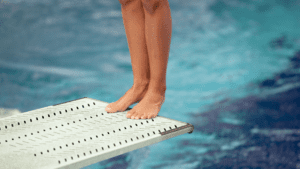Although the outdoor season is winding down, the indoor leagues are about to begin! Even more topically, last week’s MLS Playoffs kicked off with a beauty between the Portland Timbers and Sporting Kansas City. After a 2-2 tie in regulation and extra time, the win-or-go-home game transitioned into penalty kicks. The round of PKs, which usually lasts five rounds, extended into the eleventh round thanks to a bevy of incredible saves and crucial misses. Eventually, it came down to the two goalkeepers as Portland’s Adam Kwarasay scored the the game-winning goal before saving KC’s attempt to send Portland into the Western Conference semifinals. Of course, you can find all those amazing, jaw-dropping highlights here, but general sentiment is clear: the ability to save penalty kicks is a must-needed ability for any goalkeeper looking to take their game to another level. So, if you’re a keeper looking to improve on your footwork, reactions, and diving abilities, take a look at our tip video, grab our suggestions, and get practicing! First and foremost, check out CoachUp’s Instructional Video on saving penalty kicks before you go on. All you’ll need to practice penalty kicks is:
- A ball
- A net
- A partner
Now, admittedly, the keys to saving penalty kicks aren’t your commonplace suggestions for the training athlete. Of course, strength, power, and agility are all important in their own ways, but there are additional subtile nuances to consider while trying to stop the opponent from the spot. These are not so much physical traits as they are mentally demanding, forcing the athlete in net to be sharp, focused, and analyzing in all moments. In fact, depending on your level, goalkeepers spend loads of time before matches studying the attempts of the opposition’s most likely penalty kick takers. If the kicker goes to the right 80% of the time, that’s already a crucial advantage to hold during the moments just before an attempt. Next, you’ll want to consider three things: toes, eyes, and hips. A goalkeeper simply has no shot at saving the attempt unless he or she is up on their toes, waiting to pounce and react as soon as possible. Generally speaking, goalkeepers have anywhere between 0.20 and a full-second to react, but that’s hardly enough time to not only decide where to dive, but also execute it. Then, you’ve got the eyes and this applies to both the kick-taker and the shot-saver. Goalkeepers are out on an island during penalty kicks, so they much keep a close eye on the body language of their opponent. Sometimes, a kicker will inadvertently look at their desired kick location before they shoot, so keepers must be watchful for those type of giveaways. Finally, any aspiring keeper needs to focus on the hips, not the feet! Astute kickers will be able to trick novice goalkeepers with their feet, so be careful. It’s easy to assume that the plant foot will give away the shooter’s desired location, but it can be misleading. However, your hips are unmovable as they must always be over the ball and in the direction of the shot, so try using them to your defensive advantage. As for drills, there’s really nothing better than repetition and practice. Take time before and after your regular drills and workouts to get peppered with shots from different angles, distances, and athletes, but especially from the penalty spot. You know what they say: practice makes perfect — and even though you’ll never be perfect in terms of save rate on PKs, you can noticeably improve and put yourself in a better situation to succeed. Get creative with your drill! Imagine scenarios in your head or with your partner in order to create pressure or competition. Do a best-of-five series and then switch places with your partner. It may not make sense initially to swap with your friend, since you are training to save these kicks, after all, but getting inside of the mind of the shooter will only help you identify giveaways and understand their thought process while in net. All things considered, penalty kicks are very similar to free throws in basketball — the shooter isn’t supposed to miss, so goalkeepers must make sure to stay strong and positive even if they let one past. Then, when you’re prepared and trained, you’ll have a chance to change the game like Kwarasay did for Portland last week and become a team hero in the process. If you’re looking for more on saving penalty kicks, check out our Training Center article on it right over here!
How useful was this post?
Click on a star to rate it!
Average rating 0 / 5. Vote count: 0
No votes so far! Be the first to rate this post.




